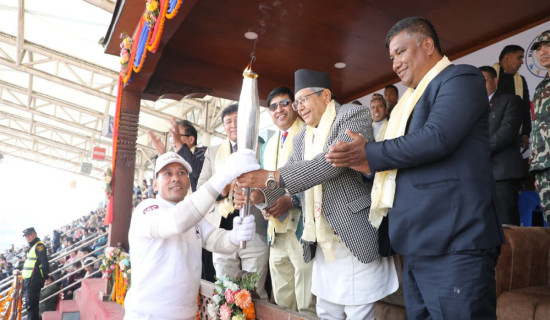- Saturday, 27 December 2025
Sustainable Waste Disposal
Bini Dahal
Every week, we are in a rush to give away our household trash to the garbage collectors in order to prevent our homes from reeking of the waste. But, honestly speaking, we are only transferring the garbage to the environment. While waste management is already a pertinent issue in Nepal, the pressure it creates is felt extra around monsoon season. And this is especially true in the urban areas of the country. Globally, many developed countries have gone for segregating the waste as a way of proper solid waste management. And landfill sites are managed well too. However, it is a far cry in Nepal, causing extra distress to the authorities and the people alike.
Recently, it has been reported that the Bharatpur Metropolitan City in Chitwan is facing the wrath of the monsoon and the flooded rivers in garbage management. Apparently, the garbage trucks are unable to reach the landfill sites because the river banks are flooded. As a result, the garbage collectors are forced to just dump them around the settlement areas. The locals are protesting and it is said that garbage has been piled up in the streets due to such obstruction. The main issue here is that the local government still has not located a landfill site for an effective waste management.
The Bharatpur Metropolis is a representative picture of current state of urban waste management. For the longest time, the Kathmandu Metropolitan City has been suffering from its own set of waste management issues. We are basically on a loop of growing waste production and the inability to manage due to our inability to better prepare the landfill sites around monsoon. Also, the existing landfill sites no longer have the capacity to hold further wastes. This has even put a pressure on the authorities to find an alternative. And most importantly, there is a continuous tussle between the authorities and the local residents living near to the landfill sites.
The locals are always concerned about the health issue posed by the mismanagement of garbage. The matter is also closely related to the fundamental right of the people to live in a clean environment. At a time when the idea of smart cities is gaining momentum, it is disappointing to see a dissatisfying level of waste management in the country. Our waste management is still limited to the handling of biodegradable and non-biodegradable waste. We have not been able to properly address the issue of hazardous and industrial wastes. These are common to urban cities today. Solid waste management, like any subject, is a matter of concern of multiple stakeholders. From the individual level itself, generating awareness of waste management is crucial.
The authorities at their level must formulate and implement practical policies and laws to better regulate waste management at individual, business and community levels. They also must join hands with the private sector and other national and international organisations to introduce innovative technologies. Through such technologies, produced waste can be reduced to a much smaller portion, putting less pressure on the landfill sites. And obviously, landfill sites have to be maintained well to minimise the issues faced by the locals living around. At a time when we keep on making rhetoric about the sustainable development goals, our words must be translated into actions. If sustainable waste management is the only way out for better urban health and environment, why not to focus our efforts on achieving them?

















